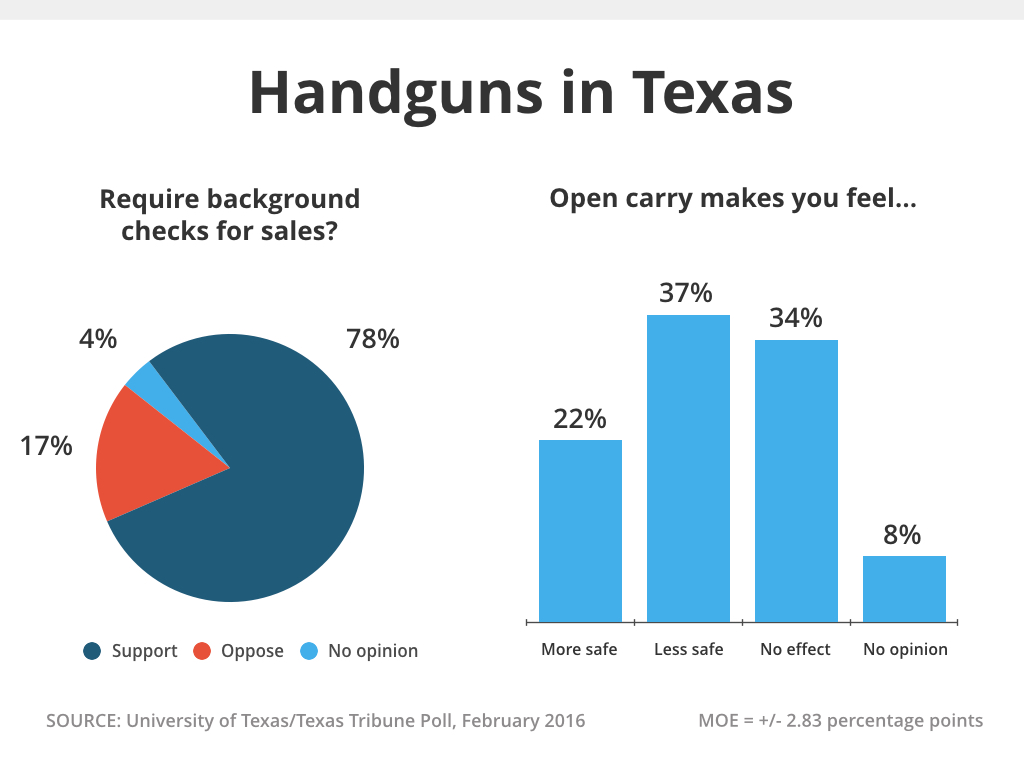UT/TT Poll: Texans Favor Background Checks on All Gun Sales
/https://static.texastribune.org/media/images/2016/02/24/TT-Primary-16charts.004.jpeg)
Texas voters overwhelmingly support mental and criminal background checks on all gun purchases in the United States — including gun shows and private sales, according to the latest University of Texas/Texas Tribune Poll.
More than half — 54 percent — “strongly support” those checks, and another 24 percent said they “somewhat support” them. Only 17 percent said they oppose those restrictions.
Support varied from one group to another, but virtually every subset of the electorate favors the checks: 92 percent of liberals, 86 percent of moderates, 66 percent of conservatives; 76 percent of whites, 89 percent of blacks, 82 percent of Hispanics; 71 percent of men, 85 percent of women. There was a distinction among conservative voters: Among those who identify more with the Republican Party, 79 percent favor background checks. But among those who identify with the Tea Party, 48 percent favor the checks and 51 percent oppose them.
Most Texas voters said they are not particularly alarmed by the state’s new open carry law, which allows people with concealed handgun licenses to carry their weapons publicly without concealing them, though there were significant differences among racial and ethnic groups.
While 37 percent said that new law makes them feel “less safe” than before, 22 percent said they feel “more safe” and 34 percent said open carry has “no effect” on their feelings of safety. The law took effect on Jan. 1.
Republican and independent voters were most likely to say they feel no effect from the change, while 62 percent of Democrats said the law makes them feel less safe. Among voters who identify with the Tea Party, 46 percent said they feel more safe since the new law took effect.
Black (61 percent) and Hispanic voters (50 percent) said they feel less safe. Only 28 percent of white voters said the same.
“It shows some of the shades of ambiguity. There is a default position among a lot of conservatives for whom this is not a front-and-center issue: That [position] is ‘no effect,’”said Jim Henson, director of the Texas Politics Project at the University of Texas at Austin and co-director of the poll. “We’re a state where the default position is a relatively pro-gun-rights culture.”
Income inequality and the minimum wage
Most Texans see income inequality as a problem but don’t think the federal government should do anything about it, the UT/TT Poll found.
A substantial number of the state’s likely voters — 44 percent — consider income inequality a “major problem.” Another 30 percent said it’s a “minor problem.” One in five said it’s no problem at all.
What to do about it? Only 12 percent said the federal government should be about as involved as it is now in solving the problem, while 37 percent said it should do more, 15 percent said it should do less, and 25 percent said the federal government shouldn’t be doing anything at all about income inequality.
Daron Shaw, co-director of the poll and a government professor at UT-Austin, said many voters are conceding the point that incomes are out of balance without agreeing that the federal government is the best source of a solution. “Those who think it’s a major problem and who think the government should do more are about the same size,” he noted.
That said, 62 percent of those Texans said they would favor an increase in the federal minimum wage, which is currently $7.25 an hour. About a quarter of them, 27 percent, oppose an increase.
Those numbers hide some underlying disagreements. While 90 percent of Democrats and 52 percent of independents favor an increase, only 37 percent of Republicans are with them. Nearly half of Republican voters oppose an increase. That’s driven by strong antipathy among those who identify with the Tea Party, 74 percent of whom said they oppose an increase in the minimum wage.
The University of Texas/Texas Tribune Internet survey of 1,200 registered voters was conducted from Feb. 12 to Feb. 19 and has an overall margin of error of +/- 2.83 percentage points. Among self-identified Republican primary voters, the margin of error is +/- 4.27 percentage points; among self-identified Democratic primary voters, it is +/- 4.57 percentage points. Among likely voters in the Republican primary race, the margin of error is +/- 4.86 percentage points. Among likely voters in the Democratic primary race, the margin of error is +/- 5.44 percentage points. Numbers in charts might not add up to 100 percent because of rounding.
This is one of a series of stories from the latest University of Texas/Texas Tribune Poll. Also today: Texans on immigration and refugees. Tuesday: How the candidates stand a week before the Republican and Democratic primary elections. Wednesday: Voter impressions of the presidential candidates. Friday: The mood of the state.
Disclosure: The University of Texas at Austin is a corporate sponsor of The Texas Tribune. A complete list of Tribune donors and sponsors can be viewed here.
Information about the authors
Contributors
Learn about The Texas Tribune’s policies, including our partnership with The Trust Project to increase transparency in news.

/https://static.texastribune.org/media/profiles/ramsey-ross_TT.jpg)